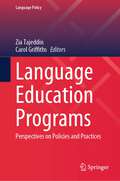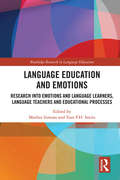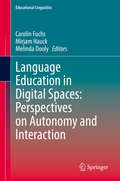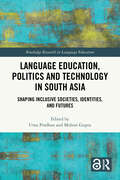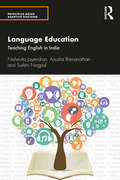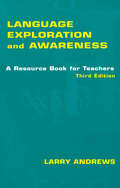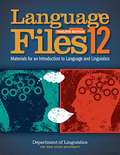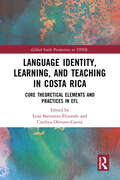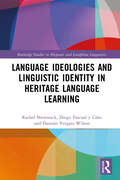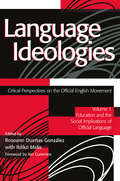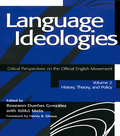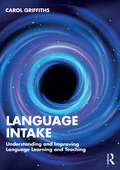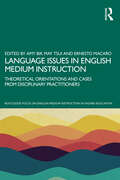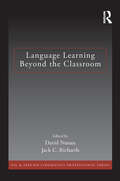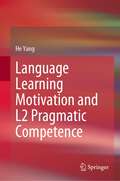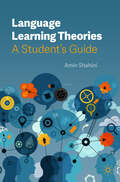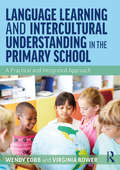- Table View
- List View
Language Education Programs: Perspectives on Policies and Practices (Language Policy #34)
by Carol Griffiths Zia TajeddinThis book delves into the realm of effective language education programs, examining them from both macro and micro-policy-making perspectives. It unravels the distinguishing features of exemplary language programs and explores how these programs are implemented in diverse international contexts. The book comprehensively explores various facets of language education programs, encompassing well-crafted language education policies, robust curriculum and syllabus design, impactful teaching materials, effective approaches to English for specific purposes (ESP), English as a medium of instruction (EMI), content and language integrated learning (CLIL), and English as a Lingua Franca (ELF)-informed instruction. The book also delves into fruitful school/institute-university partnerships, the judicious use of technology, strategies for teacher recruitment and professional development, as well as efficient policies for learner assessment, among other topics of significance. The contributions within this book are firmly grounded in data, incorporating findings from empirical studies. The insights provided draw upon valuable data obtained from a range of diverse contexts in which effective language education programs have been implemented.
Language Education and Emotions: Research into Emotions and Language Learners, Language Teachers and Educational Processes (Routledge Research in Language Education)
by Mathea Simons; Tom F.H. SmitsLanguage Education and Emotions presents innovative, empirical research into the influence of emotions and affective factors in language education, both in L1 and in foreign language education. It offers a comprehensive overview of studies authored and co-authored by researchers from all over the world. The volume opens and ends with "backbone" contributions by two of the discipline’s most reputed scholars: Jane Arnold (Spain) and Jean-Marc Dewaele (United Kingdom). This book broadens our understanding of emotions, including well-known concepts such as foreign language anxiety as well as addressing the emotions that have only recently received scientific attention, driven by the positive psychology movement. Chapters explore emotions from the perspective of the language learner and the language teacher, and in relation to educational processes. A number of contributions deal with traditional, school-based contexts, whereas others study new settings of foreign language education such as migration. The book paints a picture of the broad scale of approaches used to study this topic and offers new and relevant insights for the field of language education and emotions. This book will be of great interest to academics, researchers and postgraduate students in the field of language education, psycholinguistics, sociolinguistics, and applied linguistics.
Language Education in Digital Spaces: Perspectives on Autonomy and Interaction (Educational Linguistics #52)
by Carolin Fuchs Mirjam Hauck Melinda DoolyThis book brings together contributions on learner autonomy from a myriad of contexts to advance our understanding of what autonomous language learning looks like with digital tools, and how this understanding is shaped by and can shape different socio-institutional, curricular, and instructional support. To this end, the individual contributions in the book highlight practice-oriented, empirically-based research on technology-mediated learner autonomy and its pedagogical implications. They address how technology can support learner autonomy as process by leveraging the affordances available in social media, virtual exchange, self-access, or learning in the wild (Hutchins, 1995). The rapid evolution and adoption of technology in all aspects of our lives has pushed issues related to learner and teacher autonomy centre stage in the language education landscape. This book tackles emergent challenges from different perspectives and diverse learning ecologies with a focus on social and educational (in)equality. Specifically, to this effect, the chapters consider digital affordances of virtual exchange, gaming, and apps in technology-mediated language learning and teaching ranging from instructed and semi-instructed to self-instructed contexts. The volume foregrounds the concepts of critical digital literacy and social justice in relation to language learner and teacher autonomy and illustrates how this approach may contribute to institutional objectives for equality, diversity and inclusion in higher education around the world and will be useful for researchers and teachers alike.
Language Education in Saudi Arabia: Challenges and Opportunities in Language Pedagogy and Policy (English Language Teaching: Theory, Research and Pedagogy)
by Connie Mitchell Ali H. Al-Hoorie Tariq ElyasThis book offers a deep dive into the challenges and opportunities shaping the educational landscape in Saudi Arabia. Each chapter addresses critical issues, ranging from effective vocabulary learning strategies to the multifaceted impact of COVID-19 on second-language writing pedagogy and teacher well-being. It also sheds light on the complexities of English business communication, pronunciation instruction, student comprehension of religious texts, and the current state of language learning strategy instruction in the Kingdom. It examines the crucial role of English within Saudi Vision 2030 and sheds light on evolving kindergarten English teaching practices and parental attitudes toward English education. Drawing on a blend of research and insightful analysis, it offers a nuanced understanding of the continuous evolution of language pedagogy and policy in Saudi Arabia. This comprehensive exploration serves as an invaluable resource for educators, policymakers, researchers, and students seeking to navigate the ever-changing landscape of education in the Kingdom.
Language Education in Saudi Arabia: Integrating Technology in the Classroom (English Language Teaching: Theory, Research and Pedagogy)
by Connie Mitchell Ali H. Al-Hoorie Tariq ElyasThis volume addresses the pressing need for integrating technology into language learning and teaching practices. In an age where technology shapes every aspect of our lives, educators face the challenge of harnessing its power to enhance language education. This book provides a nuanced exploration of this complex issue, offering practical insights and innovative solutions. It discusses various perspectives on technology's role in language education, from artificial intelligence technology to hybrid learning approaches. It also examines the impact of tools such as the "Reading Progress" tool on students' reading skills and explores how exposure to language through media influences speaking proficiency. Additionally, the book deals with corpus-based studies and provides a comprehensive systematic review of research on technology and language learning in Saudi Arabia. It also addresses the challenges posed by the COVID-19 pandemic and offers insights into adapting language teaching pedagogy to online environments, ensuring continuity and effectiveness in language education. This book is essential for researchers, policymakers, educators, students, and anyone interested in leveraging technology to revolutionize language education in Saudi Arabia and beyond.
Language Education, Politics and Technology in South Asia: Shaping Inclusive Societies, Identities, and Futures (Routledge Research in Language Education)
by Uma Pradhan Mohini GuptaBringing together research from the fields of linguistics, education and technology within the dynamic context of South Asia, this timely book investigates the ways in which these fields interact with each other against the backdrop of technological innovation, linguistic diversity and socio-political transformation.Developing and expanding on findings and insights originating from a conference organised by the Education South Asia Initiative at the University of Oxford, this interdisciplinary book features academic reflections on language politics and diversity as well as empirical insights on linguistic, educational and technological transformations in the region. Featuring analytical and methodological approaches to the study of language and education, chapters range in context from India, Bangladesh, Nepal, Pakistan and Sri Lanka, and address a range of issues such as the marginalisation of languages in education and policy, the interactions between language and social hierarchies in the South Asian context, and technology’s impact on language education, acquisition, usage and preservation.Ultimately initiating dialogue on the need for positive changes in language, education research and policy, this book will appeal to scholars, researchers and postgraduate students in the fields of language education, international and comparative education, and education and technology. Policymakers in international development and sociolinguistics may also find the volume of use.The Open Access version of this book, available at http://www.taylorfrancis.com, has been made available under a Creative Commons Attribution-Non Commercial-No Derivatives (CC BY-NC-ND) 4.0 license.
Language Education: Teaching English in India (Principles-based Adaptive Teaching)
by Nishevita Jayendran Anusha Ramanathan Surbhi NagpalThis book situates the teaching and learning of language in general, and English in particular, within the sociocultural context of India. It engages with current scholarship in literacy studies and the pedagogies of language acquisition and learning. The volume discusses the cultural, discursive and sociopolitical functions of language education and the teaching of English in Indian schools. It examines the importance of adopting flexible pedagogical and multimodal strategies in teaching vocabulary; grammar; literary genres like fiction, poetry and drama; rhetorical discourses; and communicative English to learners for whom English is not one of their home language(s). It also discusses pragmatic approaches to curriculum design for communicative competence and critical literacy rooted in theoretical principles of language education. The authors analyse issues relevant to secondlanguage acquisition; English language teaching (ELT); emergent, adult and critical literacies; and critical pedagogies in language and literature. Written in an accessible style, the book comes with case studies, exercises and additional references to support an independent exploration of the fields. This book will be of interest to students and teachers of language, literature and education, as well as teachers and educators in schools and universities. It is also of relevance to policymakers, non-governmental organisations and public and private sector bodies that work in the fields of language and literacy.
Language Exploration and Awareness: A Resource Book for Teachers
by Larry Andrews"Language Exploration and Awareness: A Resource Book for Teachers, Third Edition" shows English teachers how they can expand their curriculum beyond the traditional emphases on grammar and syntax, to help their students learn about many aspects of the English language, including general semantics, regional and social dialects, syntax, spelling, history of the English language, social language conventions, lexicography, and word origins. Clear, practical, and reader-friendly, the text reviews basic aspects of English language study in classrooms, then illustrates how teachers can create student-centered, inquiry-oriented activities for the learners in their classrooms. Written from a sociocultural perspective, this text stresses the uses of authentic language as it is used by real people for real purposes in diverse social contexts. Changes in the Third Edition are: all chapters have been thoroughly updated to address new developments in the world and in the field of English and language arts education; the chapters in Section II include new Student Explorations - activities designed by pre- and in-service teachers that readers can use with students in their classrooms; and new in this edition are references throughout several chapters to Web sites that instructors and students will find useful. This text is intended as text for undergraduate and master's level English language arts courses on the pedagogies of language teaching, and as an introduction to language or introduction to linguistics courses - particularly those emphasizing language study from a sociocultural perspective; and for courses preparing teachers of English as a new language. The text is also intended as a resource for current classroom teachers.
Language Files: Materials For An Introduction To Language And Linguistics
by Hope C. Dawson Michael Phelan<P>Language Files: Materials for an Introduction to Language and Linguistics has become one of the most widely adopted, consulted, and authoritative introductory textbooks to linguistics ever written. The scope of the text makes it suitable for use in a wide range of courses, while its unique organization into student-friendly, self-contained sections allows for tremendous flexibility in course design. <P>The twelfth edition has been significantly revised, clarified, and updated throughout--with particular attention to the chapters on phonetics, phonology, pragmatics, and especially psycholinguistics. The restructured chapter on psycholinguistics makes use of recent research on language in the brain and includes expanded coverage of language processing disorders, introducing students to current models of speech perception and production and cutting-edge research techniques. In addition, exercises have been updated, and icons have been added to the text margins throughout the book, pointing instructors and students to useful and engaging audio files, videos, and other online resources on the accompanying Language Files website, which has also been significantly expanded.
Language Function
by Ellyn Lucas ArwoodLiteracy teaching tends to take a structural approach to language, focusing on auditory products or skills such as sounds, morphemes, words, sentences, and vocabulary. However, new research suggests that the majority of English speakers actually think and learn in visual concepts, and that there is a cultural and linguistic mismatch between auditory teaching methods and the way students think and learn. This has important implications for all educators including those who work with students with neurogenic disabilities, such as autism spectrum disorders and ADHD. In her new book, Dr. Ellyn Lucas Arwood outlines a revolutionary four-tiered model of how a learner acquires language, and suggests ways to impose visual language functions onto an auditory language like English in order to improve learning for both neurotypical learners and those with neurogenic disabilities. Dr. Arwood provides tried-and-tested intervention strategies that work with all levels of ability, giving readers the knowledge and confidence to teach learners to become more literate in a way that raises learners' abilities to think and problem solve. This book takes a fresh look at how language and literacy interact, and will be of interest to educators and special educators, speech and language pathologists, and other professionals who support language learning and development.
Language Identity, Learning, and Teaching in Costa Rica: Core Theoretical Elements and Practices in EFL (Global South Perspectives on TESOL)
by Lena Barrantes-Elizondo Cinthya Olivares-GaritaThis edited collection provides a comprehensive and locally situated understanding of English language teaching from the perspective of dedicated and experienced language professionals and researchers in Costa Rica. The book uses a series of reflective sections that interconnect theory and practice in a non-English-dominant context in order to inform and transform pedagogical practices. The chapters depict a wide-ranging image of English language teaching and learning in the region, encouraging in-service teachers, TESOL specialists, and ELT scholars to critically reassess, rethink, and relearn teaching and learning as more than a political decision in an educational curriculum. Ultimately promoting the practice as dynamic, ever-changing, and culturally situated, the book will be highly relevant to researchers, academics, scholars, and faculty in the fields of teacher education, educational research, EFL, and modern foreign languages.
Language Ideologies and Linguistic Identity in Heritage Language Learning (Routledge Studies in Hispanic and Lusophone Linguistics)
by Rachel Showstack Diego Pascual y Cabo Damián Vergara WilsonLanguage Ideologies and Linguistic Identity in Heritage Language Learning addresses the ways in which discourses about language value and identities of linguistic expertise are constructed and negotiated in the Spanish heritage language (HL) classroom, and how the classroom discourse shapes, and is shaped by, the world outside of the classroom.The volume examines the sociopolitical contexts, personal histories, and communicative practices of Spanish teachers and students in two diverse geographic regions: the US states of Texas and Kansas. Adopting an integrated sociocultural approach, it considers the ways in which individuals draw from multiple linguistic resources and social practices in daily interaction and how they articulate their beliefs about language through storytelling. Rich interactional data, examples from social media, and stories of community engagement are utilized to demonstrate how Spanish heritage speakers use language creatively and proactively to legitimize and claim power in their home and community linguistic practices.This is an invaluable resource for applied linguists who seek to better understand the relationship between language, ideology, and identity and for graduate students and researchers in the fields of linguistics, Spanish, and HL education.
Language Ideologies: Critical Perspectives on the Official English Movement, Volume I: Education and the Social Implications of Official Language
by ROSEANN DUEÑAS GONZÁLEZ; ILDIKÓ MELISHow do educators balance the rights of the rapidly growing percentage of the United States' population whose first language is not English or whose English differs from standard usage with the rights of the majority of students whose first and generally only language is English? This two-volume set addresses the complicated and divisive issues at the heart of the debate over language diversity and the English Only movement in the U.S. public education. Blending social, political, and legal analyses of the ideologies of language with perspectives on the impact of the English Only movement on education and on classrooms at all levels, Language Ideologies: Critical Perspectives on the Official English Movement offers a wide range of perspectives that teachers and literacy advocates can use to inform practice as well as policy. This exhaustive, two-volume collection not only updates existing information on the English Only movement in the United States, but also includes the international context, looking at the emergence of English as a world language through a postcolonial lens. The complexity of the debate is also reflected in the exceptionally diverse list of contributors, who speak from varying disciplines and backgrounds including sociology, linguistics, university administration, the ACLU, law, ESL, and English. Both volumes explore the political, legislative, and social implications of language ideologies. Volume 1: Education and the Social Implications of Official Language focuses in particular on the consequences for the classroom. In Volume 2: History, Theory, and Policy, the focus is on the implications for policymakers and language-program administrators.
Language Ideologies: Critical Perspectives on the Official English Movement, Volume II: History, Theory, and Policy
by Roseann Dueñas González Ildikó MelisFirst published in 2001. Routledge is an imprint of Taylor & Francis, an informa company.
Language Instruction for Students with Disabilities (3rd edition)
by Tom E. C. Smith Edward A. Polloway Lynda MillerLanguage development and language competence are recognized as critical emphases in the education of all children, and certainly those who experience disabilities. The substantial amount of research and programming in the diverse fields within the language domain reflects this emphasis.
Language Intake: Understanding and Improving Language Learning and Teaching
by Carol GriffithsAimed towards advanced students and researchers in language acquisition and teaching, Language Intake: Understanding and Improving Language Learning and Teaching considers the long-debated definition of language intake and its determining factors. In doing so, it presents a unique argument for language input and intake, with a particular focus on how "input", "interaction", "identity", and "investment" contribute to intake through complex intercommunication.The book defines each of the contributing factors of intake in turn and demonstrates the principles of language intake through interviews with successful language learners, in order to encourage teachers to take these factors into consideration so as to maximise intake of the target language.The author proposes that all these multiple factors contribute to what might be called the “Intake Hypothesis”, which can be outlined as a practicable framework to support teachers in providing rich, interesting, and extensive input, affording opportunities for interaction, respecting learner identity, and offering a motivating environment to encourage and sustain investment of time and effort, thereby contributing to intake.
Language Issues in English Medium Instruction: Theoretical Orientations and Cases from Disciplinary Practitioners (Routledge Focus on English-Medium Instruction in Higher Education)
by Ernesto Macaro Amy Bik May TsuiTsui and Macaro's volume addresses a central issue in English Medium Instruction (EMI) and draws on research and practice from both content teachers and language specialists.It covers a range of academic disciplines and contains contributions by internationally recognized researchers and practitioners in EMI, as well as covering both the theoretical orientations and pedagogical practices of EMI. The chapters provide an in-depth account of how language needs to be integrated into the various academic subjects being taught through the medium of English in higher education in non-anglophone countries. Its contributors are either second language specialists or teachers directly responsible for teaching in the different disciplines. The book calls for much greater collaboration between these actors and for a sense of shared responsibility for ensuring that English Medium Instruction, a phenomenon that is now established worldwide, is successful for all students.It will be of interest to students, researchers and teachers of English Medium Instruction in both secondary and higher education.
Language Knowledge for Primary Teachers: A Guide To Textual, Grammatical And Lexical Study
by Angela Wilson Julie ScanlonTeaching children to develop as language users is one of the most important tasks of a primary school teacher. However, many trainee teachers begin their careers with a low knowledge base. Language Knowledge for Primary Teachers is the reader friendly guide designed to address this. This book provides a clear explanation of the knowledge and understanding required by teachers to implement the objectives of the National Curriculum for English. It reveals how an explicit knowledge of language can enrich their own and their children’s spoken English. It will give teachers confidence in developing children’s enjoyment and comprehension of reading and writing so children can use their language skills in the real world. Updated to include references to the new curriculum, this book explores: The importance of subject knowledge in supporting children in language and literacy; Language knowledge within the context of authentic and meaningful texts, from fiction to ‘Facebook’; The links between subject knowledge and real teaching situations; New areas on talk and dialogic learning; Increased emphasis on ICT and cross-curricular study. This book will appeal to all trainee and newly qualified teachers needing to achieve both the demands of subject knowledge for Qualified Teacher Status, and a firm understanding of the expectations of the National Curriculum for English.
Language Learners in Study Abroad Contexts
by Eton E. Churchill Margaret A. DufonExamining the overseas experience of language learners in diverse contexts through a variety of theoretical and methodological approaches, studies in this volume look at the acquisition of language use, socialization processes, learner motivation, identity and learning strategies. In this way, the volume offers a privileged window into learner experiences abroad while addressing current concerns central to second language acquisition.
Language Learning Beyond the Classroom (ESL & Applied Linguistics Professional Series)
by Jack C. Richards David NunanThis volume presents case studies of language learning beyond the classroom. The studies draw on a wide range of contexts, from North and South America to Europe and the Asia-Pacific region. Each provides principled links between theory, research and practice. While out-of-class learning will not replace the classroom, ultimately all successful learners take control of their own learning. This book shows how teachers can help learners bridge the gap between formal instruction and autonomous language learning. Although English is the primary focus of most chapters, there are studies on a range of other languages including Spanish and Japanese.
Language Learning Motivation and L2 Pragmatic Competence
by He YangThis book provides comprehensive investigation of the effect of motivation on L2 learners’ pragmatic learning, which has been discussed for a long time but remains under-explored. This study examines whether and to what extent learners’ levels of motivation influence their pragmatic awareness, comprehension and production in an EFL context. It presents an original study that not only enriches our knowledge of the feasibility of modern technology in collecting large-scale data related to pragmatic competence but also eminently connects L2 pragmatics more closely with mainstream second language acquisition research by focusing on the role of motivation in pragmatic learning. This book will be of great value to researchers and postgraduates interested in second language acquisition, especially those who work on L2 pragmatics and individual variation among learners.
Language Learning Motivation in Japan
by Dexter Da Silva Matthew T. AppleThis book synthesises current theory and research on L2 motivation in the EFL Japanese context carried out by internationally recognized researchers and upcoming researcher-educators working in various educational contexts in Japan. Topics covered include the issues of cultural identity, demotivation, language communities, positive psychology, possible L2 selves and internationalisation within a key EFL context. The studies in the book utilise a wide variety of research methodologies aiming to narrow the gap between theory and practice and examine L2 motivation in primary, secondary and tertiary education. This volume will be of interest to research/teacher professionals who are currently engaged in active ESL/EFL practice, EFL educators, researchers, and teacher-trainers both inside and outside Japan, who are interested in research on L2 motivation in general and within the Japanese context in particular, as well as graduate and postgraduate researchers.
Language Learning Theories: A Student’s Guide
by Amin ShahiniThis book demystifies language learning theories and offers clear explanations, interactive exercises, and summary tables to help students connect theory with practice. It explores key frameworks such as Behaviorism, Innatism, and Constructivism, as well as modern perspectives like Chaos-Complexity Theory. Through an engaging structure, each chapter unpacks fundamental theories, debates, and real-world applications and highlights critical topics like learner diversity, automaticity, and sociocultural influences. The book also examines the impact of language learning theories on teaching strategies, classroom materials, and curriculum design. Practical examples, in-class activities, and digital resources—including YouTube references—enhance understanding and encourage active learning. Designed for undergraduate, graduate, and even postgraduate students, this essential guide balances academic rigour with accessibility, making it a valuable resource for those studying second language acquisition, applied linguistics, and language teaching. Whether new to the field or a specialist, readers will gain the tools to critically engage with research and classroom methodologies.
Language Learning and Intercultural Understanding in the Primary School: A Practical and Integrated Approach
by Virginia Bower Wendy CobbLanguage Learning and Intercultural Understanding in the Primary School shows how to deliver a progressive and holistic embedded language curriculum. It provides guidance on inclusive approaches for students with English as an additional language, including native speakers in the target language as well as language awareness activities that maximise links with learning in English. Practical and accessible, it contains classroom examples, plans, resources and pedagogical approaches all underpinned by theory, research and practice. Each chapter examines specific themes relating to language, culture, identity and wellbeing, providing rich discussions and a range of perspectives. Case studies ‘bring to life’ the examples provided, and reflection points offer the reader the opportunity to pause and consider an idea, resource, or challenging concept before moving on. Presenting a lived narrative of shared voices, the authors invite readers to learn about their own cultural and linguistic identities and how these relate to their practice. This is a must-read for teachers, language specialists and school leaders who wish for a clear rationale for the role of language, culture, identity and wellbeing within and beyond the curriculum.
Language Learning and Teaching in Missionary and Colonial Contexts: L'apprentissage et l'enseignement des langues en contextes missionnaire et colonial (Languages and Culture in History)
by Dan Savatovsky Mariangela Albano Thị Kiều Ly Phạm Valérie SpaëthThis volume assembles texts dedicated to the linguistic and educational aspects of missionary and colonial enterprises, taking into account all continents and with an extended diachronic perspective (15th–20th centuries). Strictly speaking, this “linguistics” is contemporary to the colonial era, so it is primarily the work of missionaries of Catholic orders and Protestant societies. It can also belong to a retrospective outlook, following decolonization. In the first category, one mostly finds transcription, translation, and grammatization practices (typically, the production of dictionaries and grammar books). In the second category, one finds in addition descriptions of language use, of situations of diglossia, and of contact between languages. Within this framework, the volume focuses on educational and linguistic policies, language teaching and learning, and the didactics that were associated with them.
